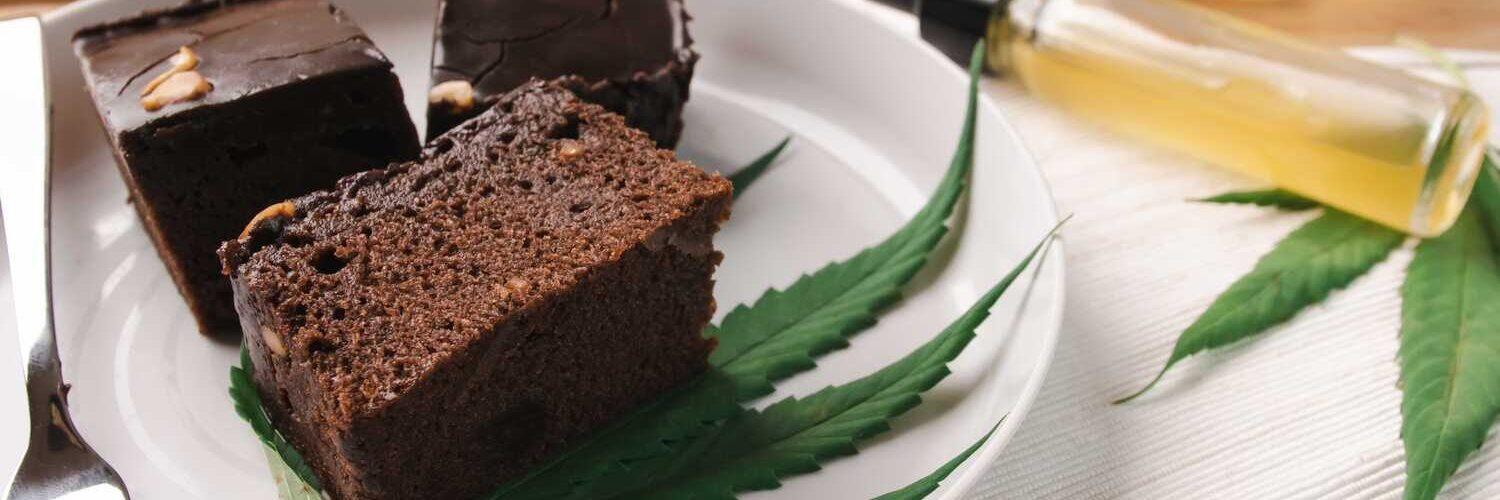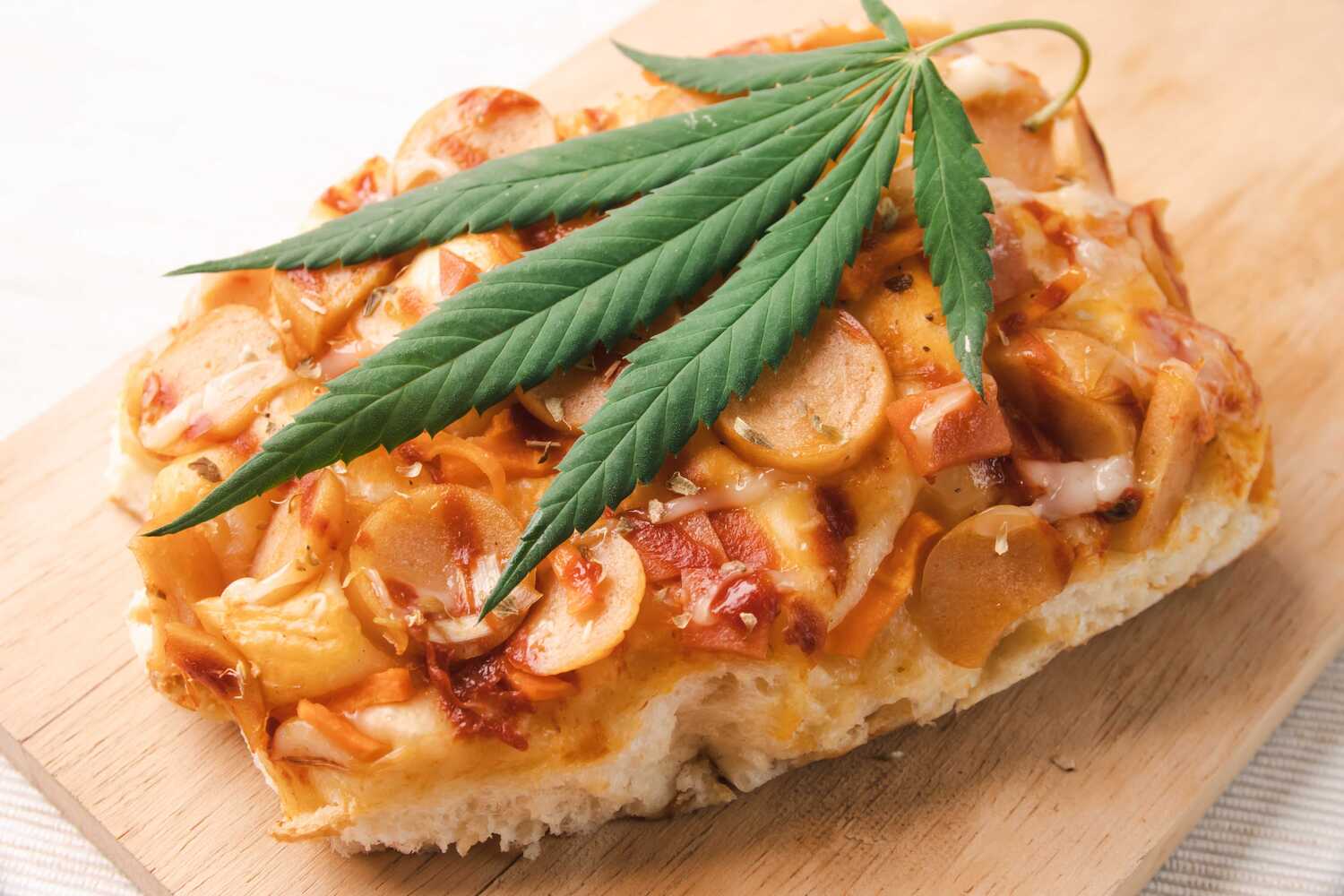- Jake Peter
- Published: January 30, 2024
- Fact-checked by Dr. Desiree Granados

Marijuana users often experience a compelling urge to raid the kitchen after consuming cannabis products. But why does cannabis induce such hunger? This phenomenon, sometimes referred to as “the munchies,” is not just a figment of the imagination or an old wives’ tale, but rather a legitimate biological response rooted in science. In this article, we’ll examine the mechanisms by which marijuana stirs up hunger and explore the fascinating interplay between the drug and our body’s natural processes.
Why Does Weed Make You Hungry?
One of the predominant reasons marijuana stimulates appetite is due to the presence of THC (tetrahydrocannabinol), or the psychoactive compound found in cannabis. When consumed, THC binds to cannabinoid receptors in the brain. More specifically, it binds to CB1 receptors, which play a significant role in the modulation of feeding behavior.
Activation of these receptors triggers a cascade of physiological responses that can induce hunger, an effect commonly known as “the munchies.” This phenomenon is attributed to THC’s ability to enhance the scent and taste of foods, thereby making the act of eating more enjoyable. Moreover, THC can influence the brain’s hypothalamus, which regulates appetite, further compelling the user to seek out and consume food.
What Are the Munchies?
The term “munchies” colloquially refers to the intense surge of appetite often experienced after consuming marijuana. This phenomenon is a well-documented effect of cannabis use that induces a compelling urge to eat even if the user was not particularly hungry before consuming their marijuana product(s). The munchies can lead to an unusual combination of foods being consumed or a stronger-than-usual craving for certain tastes and textures.
How Long Do the Munchies Last?
The duration of the munchies varies from person to person. Typically, it coincides with the drug’s peak psychoactive effects, which can last for approximately two to three hours. Factors such as the potency of the marijuana strain, individual metabolism, the method of consumption, and tolerance levels can all influence the length and intensity of this heightened hunger sensation.
For occasional users, the effects may be more pronounced and longer-lasting, while regular users could experience a shorter, more subdued response.
Side Effects and Risks of the Munchies
The heightened appetite associated with the munchies can result in overeating, which can lead to weight gain and nutritional imbalance if the foods consumed are not part of a balanced diet. Additionally, the types of foods often craved during the munchies are typically high in sugars, fats, and empty calories that contribute to health risks such as obesity, diabetes, and heart disease when consumed regularly.
Moreover, individuals with existing dietary restrictions or allergies must be particularly cautious not to consume foods that are dangerous to their health.
How Can You Manage the Munchies?
To manage the munchies, it’s important to prepare in advance. Consider keeping healthy snacks like fruits, nuts, or vegetables on hand to satisfy your appetite. Drinking water before and during your cannabis experience can also help fill your stomach and reduce the intensity of your cravings.
Establishing a meal schedule may also help by ensuring that you consume balanced meals well before or well after the onset of the munchies.
Can You Consume Cannabis without Getting the Munchies?
While the munchies are a common side effect of cannabis use, it’s possible to consume marijuana products without an insatiable urge to snack. Certain strains of cannabis, particularly those high in THC-V (tetrahydrocannabivarin), have been reported to suppress appetite instead of stimulating it.
Additionally, understanding your body’s response to different types of cannabis products can help you select ones that may have a less pronounced effect on appetite. Moreover, timing your consumption and staying preoccupied with other activities can reduce the intensity of the munchies.
Which Strains Don’t Cause the Munchies?
When discussing cannabis strains that are unlikely to induce hunger, it’s important to note that everyone’s body chemistry is different and the effects of different strains can vary. That said, some strains have a reputation for not igniting the munchies as fiercely.
Strains high in tetrahydrocannabivarin (THCV), a compound known to suppress appetite, like Durban Poison and Jack the Ripper, are often suggested for those looking to avoid hunger pangs. Additionally, CBD-dominant strains such as Harlequin and CBD Shark can minimize your urge to snack.
Is Sativa or Indica Better for Appetite?
When analyzing cannabis strains and their effects on appetite, the general consensus often indicates that indica strains are more likely to stimulate hunger. This is primarily because indica varieties typically contain higher concentrations of THC, the psychoactive compound that activates the brain’s cannabinoid receptors and triggers hunger.
Additionally, indica strains are known for their relaxing and sedative effects, which can make eating more pleasurable and less stressful. On the other hand, sativa strains are often associated with energy and focus, which often is not as conducive to a pleasurable eating experience.

Why Does Food Taste Better When You’re High?
When under the influence of marijuana, the enhancement of food’s flavor can often feel quite pronounced. This phenomenon results from the way active compounds in cannabis (particularly THC) interact with the brain’s olfactory system.
THC binds to cannabinoid receptors in the brain and heightens the user’s sense of smell, thereby making the taste of food more intense. Additionally, the euphoric effects of being high can alter the user’s perception and make eating a more pleasurable experience.
Does Eating Make Your High Go Away?
There’s no scientific evidence to confirm eating makes a marijuana high go away. The high from cannabis is primarily influenced by the brain’s absorption of THC, and the THC metabolization process is not reversed by the act of eating.
What eating may do is provide a distraction as the senses become more attuned to the flavors and textures of food, and this sensory shift may subjectively diminish the feeling of being high.
Get Your Medical Marijuana Card through the Sanctuary
The Sanctuary Wellness Institute simplifies the process of obtaining your medical marijuana card by providing a stress-free environment and expert guidance at every step. Our certified healthcare professionals are committed to understanding and addressing your needs to ensure you obtain the treatment you deserve.
With the Sanctuary, you not only get assistance with procuring a medical marijuana card, but also a trusted partner in your health and wellness journey.
States Where We Offer Medical Marijuana Card Services
How we reviewed this article:
- Skywood Recovery (2023). Does Marijuana Make You Hungry?
https://skywoodrecovery.com/resources/does-marijuana-make-you-hungry/ - Beth Ann Mayer (2023). Why People (and Worms) Get the Munchies After Using Cannabis
https://www.healthline.com/health-news/why-you-get-munchies-from-cannabis - Lester Black (2023). Why Does Weed Make You Hungry?
https://www.goodrx.com/health-topic/cannabis/why-does-weed-make-you-hungry - Tony Thompson (2001). Drug ‘munchies’ are a health risk
https://www.theguardian.com/uk/2001/jun/17/drugsandalcohol.drugs - Rob Hoffman (2023). How To Avoid The Munchies When Still High
https://herb.co/guides/how-to-get-rid-of-the-munchies - Higher Leaf (2023). 3 Easy Tips for Avoiding the Munchies
https://www.higherleaf.com/posts/avoiding-the-munchies - Adam Parsons (2023). Top 10 Cannabis Strains That Don’t Give You The Munchies
https://www.zamnesia.com/us/blog-10-cannabis-strains-that-dont-give-you-munchies-n2637 - Kimberly Holland (2023). Sativa vs. Indica: What to Expect Across Cannabis Types and Strains
https://www.healthline.com/health/sativa-vs-indica - Ronnie Okaya (2023). Why Food Tastes Better When You’re High
https://marijuanapackaging.com/blogs/cannabis-culture/why-food-tastes-better-when-youre-high - Ruth Eagle (2020). 8 ways to get ‘unhigh’
https://www.medicalnewstoday.com/articles/how-to-get-unhigh
Current Version
January 30, 2024
Written By
Jake Peter
Fact-checked By
Dr. Desiree Granados
Editorial Process
Our Editorial Process

Jake Peter received his journalism degree from Emerson College and has been writing content for the Sanctuary Wellness Institute since 2021. He is passionate about all things cannabis.







